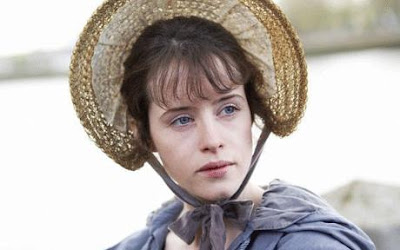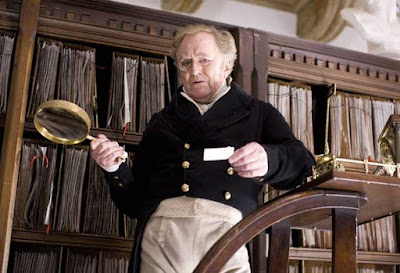I needed a break from my Wolf Hall obsession so decided to revisit another Claire Foy vehicle Little Dorrit (2008). I saw it about a decade ago and remember it being enjoyable but not anything for my list of favorites.
After rewatching I found it...surprisingly tiresome. It is one of those Dickens stories where the good characters are perfect to the point of being dull, the bad characters are dastardly evil, and the funny characters are goofy beyond belief. In order to make it "fresh" and "exciting" Andrew Davies makes everything more quirky and more dramatic. It is also seven hours.
This character is literally named Mr. Tite Barnacle
But I certainly have the time and can usually put up with a lot of nonsense and still enjoy the journey. But by the end of Little Dorrit I felt there were a few too many sour notes I just couldn't get over.
First of all, there is the character of Tattycoram. She is a servant who works for a wealthy family, primarily as companion for their vapid daughter. In this adaptation she is played by a Black actress (Freema Agyeman). Period movies should have more diversity and during the early episodes it seems like the casting choice adds an interesting layer to her story. The people she works for act like she is "family" while ordering her around and imagining that she enjoys fetching shawls and parasols. When she bristles at their requests she is told she is "wicked" and needs to control her temper. Wow some important commentary there about white people expecting cheerful docility from Black people and then being shocked when they seem angry all the time.
Tattycoram is befriended by Miss Wade, who tells her that she isn't wicked and her anger and frustration are valid. She offers shelter and protection if she ever wants to leave her employers. She eventually does...and then her story sort of fizzles out.
Dickens didn't intend Tattycoram to be black and also had no concept of writing a story about a woman of color. Let's be honest, he can barely write interesting women. The series was then adapted by Andrew Davies, who is also a white man. What starts as a potentially illuminating storyline about a black Victorian woman ends up going nowhere.
Miss Wade turns out to be sort of sketchy and it is hinted that she and Tattycoram have a romantic relationshiop -- not in a fun way but more predatory which is its own problematic can of worms. We see Tattycoram in the background of scenes looking unhappy, slowly realizing that Miss Wade is bad news, and eventually she leaves. In the final scene we see her...back with her original employers.
I DID WHAT?!
Nothing is said about how or why. We are left to wonder whether her absence helped her employers realize they need to treat her better, whether nothing has changed and her story reflects a cruel reality for Black women during this period, or whether we are supposed to think she "learned her lesson" and now is happy to be ordered around. Keep in mind, in other storylines, Little Dorrit is anything but ambiguous. It is full of lessons and moral messages. So it feels like the the filmmakers wanted a gold star for having a more diverse cast but didn't want to actually follow through with having the story go anywhere.
Similarly upsetting is the treatment of Flora Finching. Lead character Arthur Clennam (Matthew Macfadyen) is back from living in China for about 20 years, and he goes to visit his childhood sweetheart Flora (Ruth Jones). When they were young they wanted to marry but their families cruelly kept them apart. She is now a widow and so he is eager to rekindle the connection. When she sweeps into the room the music stops and HORROR...she got fat!
Arthur recoils and we are supposed to as well. Flora is an incessant chatterbox and her costuming is overly-youthful and fussy -- to make her seem as silly as possible. She is annoying and seems to have little self-awareness. But the main joke is clearly that she is unattractive and past her prime and so it is comical that she still imagines a man her own age may be interested in her. Arthur ends up with (spoiler) the titular "Little Dorrit" who is half his age and so petite that she is often mistaken for a child.
Dickens had some fun opinions about ideal women
Rather than finding Flora's scenes funny, I found them grating. To the minor credit of Macfadyen and the director, they don't make it worse by having Arthur gagging and rolling his eyes every time she flirted with him. Instead he was polite and kind. But Arthur gets two romantic interests who are in their early 20s and many business opportunities and life experiences in front of him. Flora, a woman his same age, is past her usefulness to society. No amount of bad makeup, silly clothing, and awkward chatter will hide the fact that a patriarchal system royally screwed this woman.
This is what actress Ruth Jones looks like irl










Shame you didn't like it. I loved it, it had lots of twists and turns. To change Tattycoram's part in the plot would be moving further away from the original story and into revisionist version of the novel . If Tattycoram's part had been played by a white actress would you want her story to go anywhere? It appears that your only interest in her character is because she’s black. As for Dickens and women, I thought Mrs Merdle and Lady Dedlock, from Bleak House, were great characters.
ReplyDelete